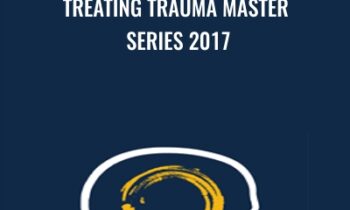-
×
 Advanced Kinesiology Taping Practitioner Certification - Aaron Crouch
1 × $85.00
Advanced Kinesiology Taping Practitioner Certification - Aaron Crouch
1 × $85.00 -
×
 Treating Trauma Master Series 2017 - NICABM
1 × $18.00
Treating Trauma Master Series 2017 - NICABM
1 × $18.00 -
×
 10 Best-Ever Anxiety Treatment Techniques - Margaret Wehrenberg
1 × $164.00
10 Best-Ever Anxiety Treatment Techniques - Margaret Wehrenberg
1 × $164.00 -
×
 (Bundle) Pindepth: Advanced Pinterest Marketing for Business - Kayla M. Butler
1 × $44.00
(Bundle) Pindepth: Advanced Pinterest Marketing for Business - Kayla M. Butler
1 × $44.00 -
×
 10 Brain-Based Strategies to Help Children in the Classroom: Improve Emotional, Academic & Social Skills for Back to School - Tina Payne Bryson
3 × $29.00
10 Brain-Based Strategies to Help Children in the Classroom: Improve Emotional, Academic & Social Skills for Back to School - Tina Payne Bryson
3 × $29.00 -
×
 3-Day Comprehensive Training: Advanced Mindfulness Practitioner Certificate Course - Rochelle Calvert
2 × $204.00
3-Day Comprehensive Training: Advanced Mindfulness Practitioner Certificate Course - Rochelle Calvert
2 × $204.00 -
×
 Mastering Lab Interpretation: Deciphering the Hidden Clues - Sean G. Smith
2 × $84.00
Mastering Lab Interpretation: Deciphering the Hidden Clues - Sean G. Smith
2 × $84.00 -
×
 Improving Diabetes Management: Tools for the Nurse - Nancy Moline
1 × $85.00
Improving Diabetes Management: Tools for the Nurse - Nancy Moline
1 × $85.00 -
×
 All Things Cardiac: Evidence-Based Approaches to Manage Any Situation - Cyndi Zarbano
2 × $85.00
All Things Cardiac: Evidence-Based Approaches to Manage Any Situation - Cyndi Zarbano
2 × $85.00 -
×
 10 Day App Success Plan – Chad Mureta
1 × $52.00
10 Day App Success Plan – Chad Mureta
1 × $52.00 -
×
 Advanced EKG Assessment - Cathy Lockett
2 × $30.00
Advanced EKG Assessment - Cathy Lockett
2 × $30.00 -
×
 1 Hour SEO | Become a Technical Marketer
2 × $40.00
1 Hour SEO | Become a Technical Marketer
2 × $40.00 -
×
 2-Day Certificate Course Emotionally Focused Therapy (EFT) for Difficult Couples: Evidence-Based Techniques to Effectively Work With Challenging Couples - Susan Johnson
2 × $124.00
2-Day Certificate Course Emotionally Focused Therapy (EFT) for Difficult Couples: Evidence-Based Techniques to Effectively Work With Challenging Couples - Susan Johnson
2 × $124.00 -
×
 Managing Geriatric Behaviors: Wandering, Aggression, Malnutrition and More - Steven Atkinson
1 × $35.00
Managing Geriatric Behaviors: Wandering, Aggression, Malnutrition and More - Steven Atkinson
1 × $35.00 -
×
 Proven Fall Prevention Strategies: Exercise, Meds Management and Home Modification - Trent Brown
3 × $40.00
Proven Fall Prevention Strategies: Exercise, Meds Management and Home Modification - Trent Brown
3 × $40.00 -
×
 “Email Response Warrior + Email Inbox Warrior” – Jason Henderson
1 × $78.00
“Email Response Warrior + Email Inbox Warrior” – Jason Henderson
1 × $78.00 -
×
 Affiliate Millionaires 3.0 2017 – Greg Davis
2 × $139.00
Affiliate Millionaires 3.0 2017 – Greg Davis
2 × $139.00 -
×
 Mastery Empowerment Course - Lauren Galey
2 × $33.00
Mastery Empowerment Course - Lauren Galey
2 × $33.00 -
×
 Managing Bedside Emergencies Online Course - Pam Collins & Cyndi Zarbano
1 × $85.00
Managing Bedside Emergencies Online Course - Pam Collins & Cyndi Zarbano
1 × $85.00 -
×
 Lara Adler - Tools For Teaching Toxicity
1 × $38.00
Lara Adler - Tools For Teaching Toxicity
1 × $38.00 -
×
 Pain Management in the Elderly - Steven Atkinson
1 × $35.00
Pain Management in the Elderly - Steven Atkinson
1 × $35.00 -
×
 Optimizing Compliance and Maximizing Revenue for Ophthalmology and Optometry - Jeffrey P. Restuccio
1 × $85.00
Optimizing Compliance and Maximizing Revenue for Ophthalmology and Optometry - Jeffrey P. Restuccio
1 × $85.00 -
×
 12 Dimensions of Mastery (Lifebook Challenge)
2 × $92.00
12 Dimensions of Mastery (Lifebook Challenge)
2 × $92.00 -
×
 10x Launches - Copy hacker - Ry Schwartz
1 × $92.00
10x Launches - Copy hacker - Ry Schwartz
1 × $92.00 -
×
 Upgrade your productivity - Entheos Academy (VA)
1 × $25.00
Upgrade your productivity - Entheos Academy (VA)
1 × $25.00
You may be interested in…
-
Add
 3-Day: Vestibular Rehabilitation Intensive Training Course - Jamie Miner
3-Day: Vestibular Rehabilitation Intensive Training Course - Jamie Miner
$599.99Original price was: $599.99.$244.00Current price is: $244.00. -
Add
 2-Day: Medical Screening and Differential Diagnosis Intensive Training Course - Shaun Goulbourne
2-Day: Medical Screening and Differential Diagnosis Intensive Training Course - Shaun Goulbourne
$439.99Original price was: $439.99.$180.00Current price is: $180.00. -
Add
 3-Day: Comprehensive Training in Women's Health: Today's Best Practices for Improving Recovery and Outcomes - Debora Chasse
3-Day: Comprehensive Training in Women's Health: Today's Best Practices for Improving Recovery and Outcomes - Debora Chasse
$599.99Original price was: $599.99.$244.00Current price is: $244.00. -
Add
 2-Day All Things Pulmonary - Cyndi Zarbano
2-Day All Things Pulmonary - Cyndi Zarbano
$299.99Original price was: $299.99.$125.00Current price is: $125.00. -
Add
 2-Day Certificate Course: Treating Trauma in Intimate Relationships - Healing the Trauma Legacy in Couples Therapy - Janina Fisher
2-Day Certificate Course: Treating Trauma in Intimate Relationships - Healing the Trauma Legacy in Couples Therapy - Janina Fisher
$299.99Original price was: $299.99.$124.00Current price is: $124.00.
 Advanced Kinesiology Taping Practitioner Certification - Aaron Crouch
Advanced Kinesiology Taping Practitioner Certification - Aaron Crouch  Treating Trauma Master Series 2017 - NICABM
Treating Trauma Master Series 2017 - NICABM  (Bundle) Pindepth: Advanced Pinterest Marketing for Business - Kayla M. Butler
(Bundle) Pindepth: Advanced Pinterest Marketing for Business - Kayla M. Butler  Mastery Empowerment Course - Lauren Galey
Mastery Empowerment Course - Lauren Galey  Lara Adler - Tools For Teaching Toxicity
Lara Adler - Tools For Teaching Toxicity  Upgrade your productivity - Entheos Academy (VA)
Upgrade your productivity - Entheos Academy (VA) 